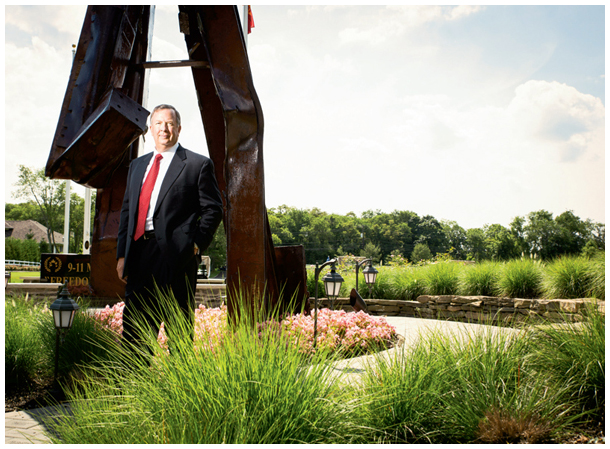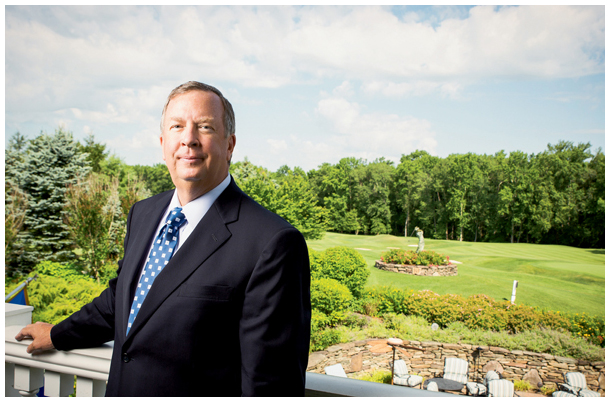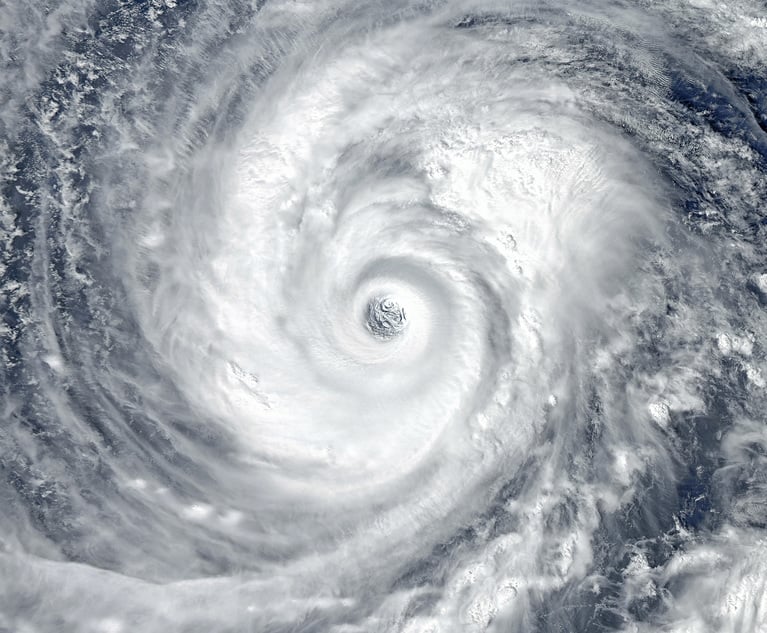The insurance business can be a funny thing. While it hasprovided fulfilling careers for thousands of people, so very few ofthem sought it out as a vocation. Even many of the industry's mostsuccessful players will tell you that selling insurance wasn'ttheir first choice for a career, or that it was done on a larkuntil something better came along.
|Andrew C. Harris is one of them.
|The immediate past president of the National Association ofProfessional Insurance Agents (PIA National), Harris serves on theexecutive committee of the national board of directors, is vicepresident of PIAPRO, PIA's agent-owned captive insurance company,and is PIA National's liaison to the Insurance Services Office.
|His 38 years' experience in insurance sales and agencymanagement includes more than two decades spent as president andCEO of Liberty Insurance Associates of Millstone Township, N.J., amulti-line agency with more than 40 employees.
|So naturally, in college, he majored in biology andchemistry.
|"I was a pre-med major, actually," says Harris, a Livingston,N.J., native. "I didn't get into medical school, so I decided Iwould work for a pharmaceutical company since I had the backgroundfor that."
|He went to a Manhattan-based headhunter to see if he could beplaced with one of the larger pharmaceutical companies. Therecruiter sent him on a drill interview with Liberty Mutual, whichwas looking for salesmen. "I said, 'Who are they?' He said it wasan insurance company, and I said, 'Oh God no, no. I have nointerest in that at all.'"
| Upon the recruiter's urging, Harris went onthe interview anyway. "It wasn't at all what I was expecting," hesays. The position was in commercial sales and national accountsout of Liberty Mutual's East Orange, N.J., office. They wanted him,and he took the job. "I knew nothing about insurance, but I wasfascinated by how I would learn about insurance and how it relatesto every business on earth."
Upon the recruiter's urging, Harris went onthe interview anyway. "It wasn't at all what I was expecting," hesays. The position was in commercial sales and national accountsout of Liberty Mutual's East Orange, N.J., office. They wanted him,and he took the job. "I knew nothing about insurance, but I wasfascinated by how I would learn about insurance and how it relatesto every business on earth."
In those days, he recalls, the carrier boasted one of the besttraining programs in the industry. "They would put you through verystructured training," he says. "You'd go away and spend weeks inthe classroom, then you'd go back to your field office, work withyour sales manager, get some sales experience and then go back [toschool] again. Then go back to the field, and then go backagain."
|After about six months of this boot-camp approach, "you reallyunderstood insurance," he says, acknowledging the valuable,cornerstone insight he gained during that first half-year in thebusiness.
|"I owe everything in this business to them," says Harris, whostill has friends whom he met at Liberty Mutual 38 years ago. "As amatter of fact, several of us, after we had left Liberty and wentafter the agency brokerage field, got together again and formedLiberty Insurance Associates, which is our firm."
|The Next Generation
|The tipping point for striking out on his own, Harris says, waslearning a bit more about the world of compensation. "I was verysuccessful there and did very well," he says. "The only reason whyI left was that Liberty Mutual was very new-business oriented andas a salesman you were not paid renewal commissions.
|"Over time I got to know people on the agency/broker side andthey were telling me about their renewals, and I went, 'Whatrenewals?'" he laughs. "Suddenly the light went on and I realizedthere's a whole different world in insurance if you were paidrenewal commissions as well as new business commissions." Forexample, in those days, property risks were written as three-yearpolicies; if the client didn't renew in year two or year three, thecarrier charged you back your commission.
|"That was the reason many people left and ventured into theagency/broker community," he adds. That spirit of entrepreneurship,he says, "is one of the big things that over the years we've beentrying to recapture in the independent agency system— bringing thatnext generation into our business."
| Indeed, one of the biggest challenges in theindependent agency system today is finding a way to attract youngpeople out of college and make them realize they can learn a trade."I'm speaking primarily about commercial insurance, but insuranceisn't something that you just sort of drop into and say, 'OK, I'man expert,' although some people claim to be," he says. "It's takenme 38 years.
Indeed, one of the biggest challenges in theindependent agency system today is finding a way to attract youngpeople out of college and make them realize they can learn a trade."I'm speaking primarily about commercial insurance, but insuranceisn't something that you just sort of drop into and say, 'OK, I'man expert,' although some people claim to be," he says. "It's takenme 38 years.
"I started with a CIC, and then got my CPCU designation, thenARM," he says, listing his designations, which—as is far more oftenthe case than not among those who take the time and effort toachieve them—clearly mean a lot to him. He next earned his CRM andthen AIS, all with the goal of seeing insurance service"specifically from the eyes of the customer, and approaching eachmoment of truth in the interactions you have with theconsumer."
|Approximately 70% of Liberty Insurance Associates' revenue iscommercial insurance, broken down into three units: large, middlemarket and small. About 12% of the agency's business is in life,ancillary products, voluntary benefits, regular group benefits andwealth management, with the balance in personal lines and uniquebusiness.
|"Our mission is to solve problems in every way we can—and tounderstand that most times in insurance claims, it's not just afinancial claim, it's a personal problem that people have; it'ssomething that affects them personally," he adds. "You can't everlose sight of that."
|Rethinking Customer Service
|Interactions with clients and even prospects have changeddrastically over time, says Harris. These days, everyone with aquestion wants an answer yesterday.
|"The expectations of customers now are, 'I need information now,I want it correct the first time, and I want you to deliver it whenand how it's comfortable for me,' which obviously, over the courseof my career has changed dramatically," he explains. If you don'tget back to a client or a friend, or even a contemporary the sameday, he adds, they're prone to think something's happened toyou.
|Around 2003, the agency began routing small commercial- andpersonal-lines customers directly to their respective carriers'service centers—a decision made after a good, hard look at theagency's processes. "Our internal client-management system allowedus to look at the transactions that we had with our clients," heexplains. (Every time Liberty Insurance Associates receives a call,letter, email, or any other type of interaction with a customer,it's recorded and filed in the agency's system.)
|Once Harris and co. were able to look at the transactional logof each client, "we realized our cost drivers were not necessarilythose clients who were generating our revenue, and we were actuallygiving short shrift to our best customers and over-servicing thedemands of customers who were much smaller, but had a much higherdemand for transactional business," he says. Smaller clients, forexample, often need numerous certificates of insurance, which takestime—and often, the client needs them immediately.
|"The centers are set up to handle those calls very efficientlyand effectively and can do it cost-effectively. The [client] canstill call us on any issues and we're always available," headds.
|When it comes to the agency's social media strategy, "I decidedlong ago that I'd be an expert at what I know, and I let otherpeople that know more than I do, handle those," says Harris.
|His son, Andrew, handles much of the technical aspects of theagency, including its social media use of Facebook, Yelp, LinkedIn,Twitter and other platforms, and about six months ago the agencystarted using Astonish as its marketing and sales platform to greateffect, he adds.
|"Now we can send out campaigns, and if someone clicks on a link,that information is sent back to us and we capture thatinformation," he says. If a particular producer is responsible formarketing that campaign, he or she will receive a text or an email."We actually have it set up for text message, so if someone says,'Yes, I want a quote,' or 'Call me,' within moments they're gettinga text saying, "You can call X at this number, he's interested ingiving you a quote.'"
|Additionally, a major investment in automated services haslinked the producers' iPads directly to the agency's internalprocessing system, allowing for fast response time remotely. Thesystem also sends reminders to both producers and clients whencoverage is near expiration and at other milestones.
|Such technological tools, combined with deep client-facingknowledge an independent agent provides, are a one-two punchagainst the direct writers of the world.
|"The pathway for the independent agency is becoming clearerbecause of the great marketing level impact that electronicmarketing has had," Harris says. "We can now start recapturingmarket share that is taken away from us in print, television,radio, billboards and magazines. You know some [of the majors']advertising budgets are incalculable, but for a very modestinvestment, you can be right up there with them now.
|"There isn't a customer that we have who can't probably buyinsurance at a lower price, if they looked hard enough," he adds."So our challenge is to show our customers that the money they'repaying is well spent, and that the value they're getting is worthit."
|A Leadership Role
|Harris would certainly seem to know a thing or two aboutvalue—and leadership. In 1996 he was selected as PIA of NewJersey's Agent of the Year, and received a joint resolution fromthe New Jersey Senate and Assembly recognizing this achievement. Heserved as President of PIA of New Jersey from 1998 to 1999. In June2006, he received the PIA of New Jersey's Distinguished InsuranceService Award. In addition, he has served on the Regional AgentsAdvisory Boards of CNA Pacer, Crum & Forster, Hanover, OneBeacon and the Harleysville producers councils.
|Nationally, he has served on the Crum & Forster NationalAgency Council and Harleysville Insurance Co. National Board. From2003 to 2008 he served as president of the Proformance InsuranceCo. in Freehold, N.J.
|His accomplishments at the state level are no less impressive:Harris was appointed by the governor of the Garden State to theDepartment of Banking and Insurance Disaster Response PlanDevelopment Group, and is a member of the Department of Banking andInsurance Study Commission and the New Jersey InsuranceCommissioner's Insurance Education Advisory Committee, and heserved on the Commissioner's Producer's Advisory Council for morethan a decade. He also has served on the Board of Governors of theWindstorm Marketing Assistance Plan.
|All of this while he's leading his own agency, of course. Whichbegs the question, what motivates a producer who's accomplished somuch?
|"I'm still focused on our [own] business and growing it, but asyou get older in business you start to look and say, 'How can Igive back and help the people who are where I was, many years ago,succeed and continue?'" he responds.
|Part of that is making sure that up-and-coming independentagents have the same opportunities that he had, especially withregard to training.
|"The most important thing right now is to have a platform fornew agents to become truly independent and not just join a directwriter," he says, adding that organizations like PIA are uniquelypositioned to help brand-new agents starting in the business.
|It's no secret that many carriers no longer train new producers,and for independent agents, getting a leg up is critical—especiallyin the first three to five years of selling. Educational programslike those offered by organizations like PIA can provide the samecornerstone of knowledge that Harris received at LibertyMutual.
|"We'll give ongoing training even inside your own agency," hesays of PIA, and will also help agents get appointments withcarriers.
|"In my entire insurance history, I have never asked anotheragent for help on anything and been rejected or denied," he says."As an industry, we are the most incredible, benevolent competitorsyou can imagine."
Want to continue reading?
Become a Free PropertyCasualty360 Digital Reader
Your access to unlimited PropertyCasualty360 content isn’t changing.
Once you are an ALM digital member, you’ll receive:
- All PropertyCasualty360.com news coverage, best practices, and in-depth analysis.
- Educational webcasts, resources from industry leaders, and informative newsletters.
- Other award-winning websites including BenefitsPRO.com and ThinkAdvisor.com.
Already have an account? Sign In
© 2024 ALM Global, LLC, All Rights Reserved. Request academic re-use from www.copyright.com. All other uses, submit a request to [email protected]. For more information visit Asset & Logo Licensing.








